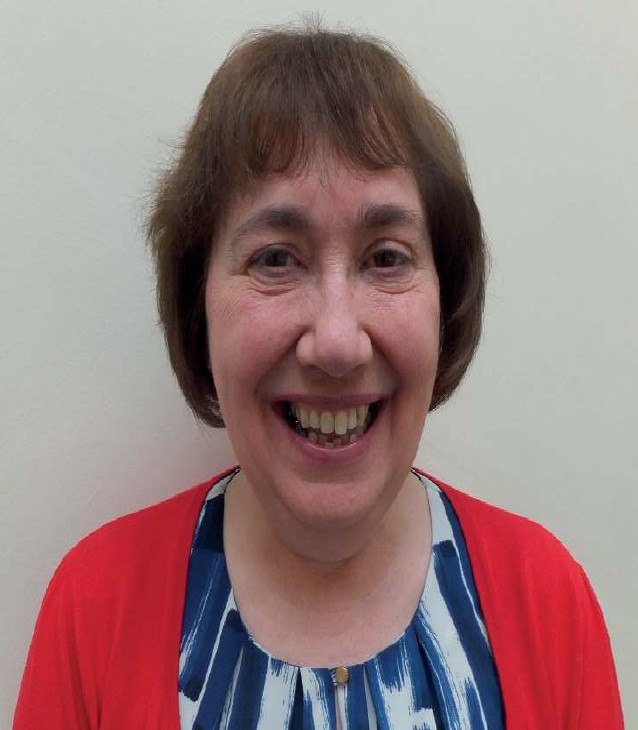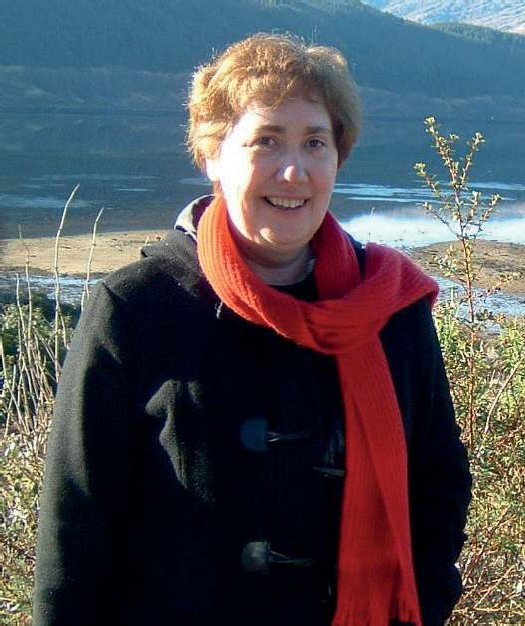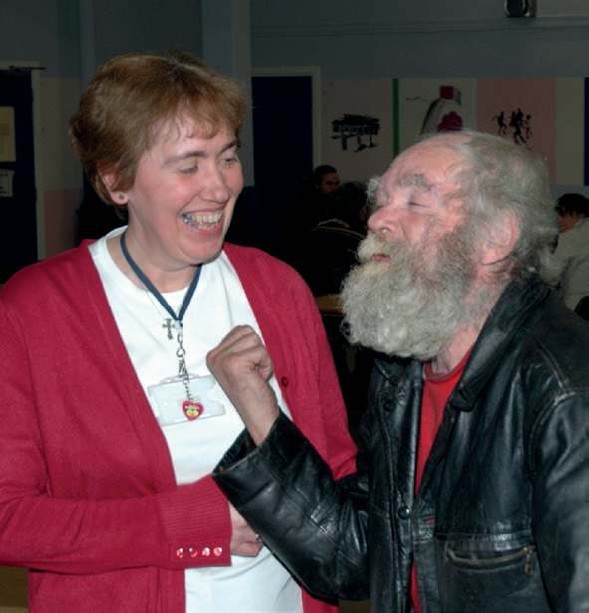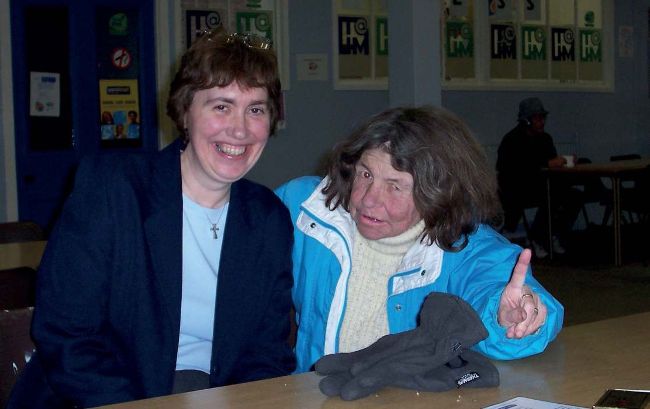‘I love what I do’
Jackie Macadam meets Ann Lyall DCS and learns more about her work with addicts.
PROFILE
“I REMEMBER one chap who used to come in. Very smart. Very well dressed. He seemed not to belong. And yet he did. He was homeless. His relationship had broken down. He’d lost everything. He had a gambling addiction.”
Ann Lyall, DCS is talking about just one of the extraordinary people she met when she worked as chaplain to the Lodging House Mission in Glasgow.
“John 10:10 ‘I have come that you might have life, life in all it’s fullness’ is the verse from the Bible I always wanted to share with others especially the most vulnerable, neglected and marginalised in our world,” says Ann. “That feeling took me from a comfy home as the daughter of a minister in Lanarkshire to working for over 20 years in Castlemilk East in Glasgow and then to being chaplain for those who came to the Lodging House Mission for help and relief, and then on to being a deacon that is parachuted in to help wherever and whenever I’m needed.
“The thing that really appealed to me about LHM was that there was absolutely no judgment. People would come in with every problem under the sun. Relationship breakdowns are actually the biggest cause of homelessness, and those breakdowns can be caused by any number of things.
One of the other groups most affected by homelessness are young people who have left care – they become an ‘adult’ and are then left to their own devices, often with no real preparation for coping and living in society and looking after themselves, especially financially.
“Those who have been in prison, those who have addictions, those with mental health issues – the statistics are horrendous for young people brought up in the care system.
“And those who have been in the armed forces – particularly the army – seem to make up a shockingly high level of those affected by homelessness.”
Ann was born in Edinburgh but as a child moved to Kirkmuirhill where her father was a minister.
“I left school at 16 and went to work in an insurance office, but I soon realised that it wasn’t for me. Something was missing. “I’d resisted going into the ministry but I felt very drawn to the church. I wanted to explore my feelings and went to St Ninian’s Training Centre in Crieff, the one that was started by D P Thomson. The Rev Douglas Nicol was deputy warden when I was there.
I spent a year at the centre, with six others and we were sent to various parishes across Scotland helping with mission and outreach.
“I was very affected by the report of the Committee of 40 to the General Assembly where they said that there was a role for everybody. I very much wanted to find my role.
“I knew I didn’t want to be a minister but when I heard about the Diaconate, something caught my attention. I went to St Colm’s for two years and did a further post graduate degree in teacher training at Hamilton College.
“From there I was sent to Castlemilk East.
Not really the place I imagined myself working when I imagined my ministry (at the time, deaconesses were being sent to the growing new towns all over the country), but I soon realised I was exactly where I needed to be.
“I was there for 23 years. It sounds obvious, but over that period of time I really got to know the people – and even better – to be accepted as part of the community.
“There were six schools I visited and I got to know the youngsters well. I remember passing one child in the street one day and she whispered to her mum, “that’s Miss Lyall” and the mum nodding and saying that she knew me too. Mum had also been a youngster I’d worked with when she was younger…
“During my time in Castlemilk East I took a year’s sabbatical as a volunteer to work in Guatemala with a World Mission programme called ‘World Exchange’. I worked with a small church there who wanted some background and encouragement, then it was back to Castlemilk East.
“I knew about the Lodging House Mission of course, it was well known in the Glasgow Churches, and when the post of chaplain became vacant in 2002, I was asked if I would consider taking on the role. It seemed the right time to be moving on and I was the first and so far the only woman to be chaplain there.
“The Lodging House Mission was – and is – an amazing place. In the ‘old days’ you’d have to take part in worship before you could partake of the benefits of the Mission, but that rule was dropped over time.
“When I was chaplain there, we used to have around 25 to 30 people who would come along on a Sunday evening to the service, and others who would attend bible study and prayer groups through the week.
“Perhaps 90% of them were men. They were not church-goers in general, but they all loved to ask questions about the bible readings, the lessons or just what they’d heard and faced. They had a real desire to ‘take part’ in the service, and not just be spoken to. Some would light candles, some would read lessons. They just wanted to DO rather than be done to.
“During our ‘Open Prayer’ time, they would pray about things that were on their mind. There were no inhibitions when they prayed. It was really beautiful, eye-opening and humbling to see people with nothing, praying and talking to God. So much of our time there was spent just listening to people talk.
“The local Guilds worked tirelessly in the kitchens at the LHM. They cooked endless pots of soup, made countless rounds of sandwiches and served I don’t even know how many meals.
“I think there I felt closer to doing what Jesus wanted us to do than any other place I’ve worked. It was one of the holiest places I’ve ever spent time in.
“I remember when one older man, a ‘regular’ if you like, died.
“Death could be tricky. Sometimes families claimed bodies, sometimes they didn’t. Sometimes those who did wanted to draw a veil over their loved one’s life and asked people from the LHM not to attend the funeral. Sometimes they were happy to see us.
“I was always willing to take the funerals of those who had no one else. Sometimes, as in the case of that man, he had been coming to us for a long time. It was incredibly sad. We’d got to know him – he came almost every day – and as with people with few places they can relax, trust and simply be with, he was a part of our community, our family, in a very real way.
As a community we kept a memorial book, where every single person who died was recorded in a page of their own, where their friends could memorialise them and where they would not be forgotten and would have a lasting memory to them.
“I also tried to run a retreat twice a year where I would take between 12 and 15 people away. We went to places like The Bield, Iona and Lindisfarne. “It could be a very nervous time for me – these were people with very chaotic lifestyles – but it was incredibly satisfying.
“Many times during the retreat, they would come and tell me that it was the first time in years they’d felt safe when they slept, especially the women. Their situation on the streets was so much more risky and dangerous than the men’s. I remember one woman showing me the hand marks round her neck where someone had tried to throttle her. They found relief when they didn’t have to queue for a shower and didn’t need to have all their belongings in a black plastic bag inside their shower stall just so they could keep an eye on their stuff.
I left school at 16 and went to work in an insurance office, but I soon realised that it wasn’t for me. Something was missing… I was very affected by the report of the Committee of 40 to the General Assembly where they said that there was a role for everybody. I very much wanted to find my role.

Ann Lyall DCS
“In the evening we would get into the deepest, most profound conversations. It was truly a blessing to be able to be a part of that.
“I found out that there is a community spirit among the homeless – they tried to help each other as best they could and looked out for each other. Sometimes they would just disappear and you were never sure what happened to them. You feared the worst but sometimes I would see them in other cities. Disappearing and relocating was one of the ways they would deal with people chasing them for money or drugs or with threats of violence.
“Many of the addictions were caused initially by self-medication. People on the street have a lot of time on their hands.
A lot of time to feel humiliation; the cold; the rain. Hunger. Boredom. Taking drugs or drink is a way of losing time, of not noticing the hours passing.
“Unfortunately it also makes them very difficult to deal with. Alcohol especially can make them very aggressive. Fortunately we were well-trained on dealing with that kind of problem, how to respond appropriately.
“The contributions made by other charities to the work of the homeless cannot be underestimated, especially among homeless women.”
Part of the pastoral care Ann was involved in meant visiting hospitals and prisons too.
TB was one of many illnesses that homeless people suffered from she says.
“People often found themselves in hospital with really nothing to their name. When I went to visit I’d take some personal toiletries, maybe even some pyjamas if they needed them.
“I also visited addiction centres, which is quite unusual, but because I was there as a professional, I was allowed access to people going through detox.
“Though we never tried to force people to change their lifestyles, we would allow them to choose a different route in life, and try to have the means on hand to help them if that’s what they want.
“While I was there we were involved in the Football Homeless World Cup and took some of the young men there to play for Scotland.
“They were really surprised at the levels of homelessness they found other people were subject to. It was a real eye-opener for them.
“One of our older gentlemen had developed KorsakoffSyndrome – a memory problem that can be associated with alcoholism.
“He’d get on a bus and forget to get offand the bus company would sometimes call us to see if we could come and get him.

Ann Lyall DCS

Ann Lyall at Lodging House Mission

Ann Lyall at Lodging House Mission
On another occasion he was taken to a homeless hostel where the staffsuggested the police get in touch with me as I was likely to know who he was.”
Ann left her work at the Lodging House Mission in 2010 and became a ‘peripatetic’ deacon, doing the job of an interim minister effectively.
“I have worked all over the place now,” she says. “I was placed for a time in Ardnamurchan, and then for a while in the Biggar area working with eight churches there as they went through the process of change caused by Presbytery Planning. Then I worked in Muirhouse in Edinburgh and at the Old Kirk, Pilton as they became one congregation. ”
Then for eighteen months, I was sent to my old home – Kirkmuirhill, where my Dad had been minister so many years earlier.
“There had been changes, of course, but I was glad I was able to have been there and helped, during what was, for the congregation there, a difficult and distressing time.
“Now I’m based in Avonbridge/ Torphichen outside Edinburgh. I’ve been there for around six months now as their interim deacon.
“The thing with this life, though I guess it’s hard to put down roots anywhere, is that it’s a life full of adventure. You never know where you’ll be sent next time, who you’ll meet, what situations you’ll face.
“I never married and have no children, so I can do many things, go many places, that people who have family commitments can’t – or not without significant upheaval.
“I’ve been to Zambia, Tanzania, and Kyrgyzstan, India, Nepal as well as more ‘normal’ places like Canada, sometimes on holiday on an ethical travel journey, but more often representing the Diaconate.
“I love what I do. Every year is an adventure for me.”
The thing with this life, though
I guess it’s hard to put down roots anywhere, is that it’s a life full of adventure. You never know where you’ll be sent next time, who you’ll meet, what situations you’ll face.